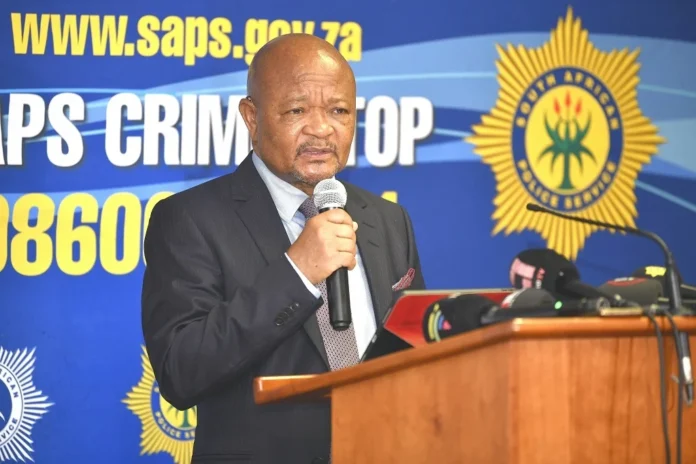Crime levels in South Africa remain at an unacceptably high level, and more work needs to be done to ensure the safety of all South Africans, according to Minister of Police Senzo Mchunu.
Speaking at the SAPS Academy in Pretoria on Friday morning, Mchunu reflected on his first year in office and outlined a series of reforms designed to strengthen law enforcement and enhance service delivery within the South African Police Service (SAPS).
Mchunu acknowledged that while recent crime statistics showed a slight decline, public sentiment suggested otherwise. He highlighted that murder, the proliferation of illegal firearms, and drug trafficking remain critical priorities for the SAPS. "These crimes continue to rob families of their loved ones, destabilise communities, and undermine our nation’s development," he stated.
Mchunu said, "It has been 11 months and 14 days since the new administration was ushered in and the new Ministry took office. Shortly after joining the Ministry, we received an elaborate orientation from SAPS top management, which helped us assess the current crime-fighting programs and the organogram."
He added that "Where changes were necessary, we have implemented them – and will continue to do so,"
Mchunu briefed the media on Friday morning to highlight some changes that will be implemented to enhance service delivery in the South African Police Service (SAPS).
Mchunu said, despite a decrease in crime during the fourth quarter, police need to increase crime-fighting.
“We know that we're still far from getting to the level where we want to get to, and satisfying that criteria where people must say we feel safe now in South Africa. When we are in our homes, when we walk around and all of that, we still have a lot of work to do in that area, but it was worth noting that we now have this consistency of decreases in crime that are reported in police stations as reflected on our crime stats for the fourth quarter.”
One key announcement was the introduction of a new online electronic recruitment system for aspiring police officers. The SAPS is seeking to recruit 5,500 new police trainees, whose training will commence between January and February 2026. The recruitment drive will be advertised before the end of June.
National Police Commissioner General Fannie Masemola explained that, for the first time in the history of the SAPS, an online electronic recruitment system is being introduced. This will allow aspiring applicants to apply online, streamlining the process and enhancing accountability. "The introduction of this online electronic recruitment system aims to avoid allegations that manual applications are being lost and misplaced in the recruitment process," he said.
Masemola also noted that the age limit to join the SAPS has been increased to 35 years of age, in line with the National Youth Policy. "We are moving away from the manual way of doing things and embracing the use of technology to tighten the control measures and enhance accountability," he added.
Currently, there are 5,500 police trainees at various SAPS academies nationwide, who will graduate in August and December this year. All 5,500 will be deployed to various police stations and units to bolster crime-fighting efforts, Masemola confirmed.
Mchunu pointed to the April 2025 National Policing Summit, themed "Efficiency in Action: Optimising South Africa’s Policing Potential," as a turning point for SAPS strategy. The summit produced several outcomes that are now being implemented, including:
- Adoption of new technologies for better crime detection, response, and analysis.
- Strengthening Crime Intelligence to shift towards proactive policing.
- Upskilling detectives to improve complex investigations.
- Upgrading forensic services to boost prosecution success.
- Improving fleet management, infrastructure, and procurement systems.
- Enhancing working conditions to boost morale and performance.
Mchunu confirmed that consultations with SAPS management and organised labour have been completed through the Safety and Security Sectoral Bargaining Council (SSSBC). Key structural changes are also being implemented, including:
- Splitting the Visible Policing Division into a Visible Policing Division, focused on frontline service and visibility, and an Operational Response Services Division, focused on specialised units, border, and national security.
- Splitting Detective and Forensic Services into two distinct divisions: Detective Services Division and Forensic Services Division.
"These changes are not just about form – they’re about function," Mchunu said. "They enable clearer mandates, better focus, and quicker responses to complex crime challenges."
The interventions announced include the introduction of new allowances, this is in a bid to retain skills in high-risk environments.
National Commissioner Fannie Masemola said the detective investigator scarce skills allowance will be allocated to members of the National Intervention Unit (NIU).
He explained that this unit mainly responds to high-risk incidents, such as cash-in-transit armed robberies and ATM bombings.
Masemola said, “Later on, this morning [Friday], we will be conferring the operators' badge to 35 qualifying NIU members that have undergone the necessary training to serve in this elite unit. We are also pleased to announce that there will be an increase.”
Mchunu reiterated SAPS’s zero-tolerance stance on corruption, pointing to a recent case where three warrant officers from the KwaZulu-Natal Provincial Taxi taskforce were found guilty of soliciting a bribe. They are currently in custody, with sentencing scheduled for 19 June. "We have stated unequivocally that there is no tolerance for corruption within SAPS, and we repeat that today," he said.
Mchunu also warned the taxi industry about lawlessness. "We want to warn police against entangling themselves in taxi affairs, as it compromises law enforcement," he added.
Masemola said that they have been hard at work in ensuring that they increase our footprint and bring services closers to the communities that we serve. In the last five years, they have managed to build 31 police stations across the country. These include, Bolobedu police station in Limpopo, Qhasa police station in the Eastern Cape and the Tafelsig police station in the Western Cape, just to mention but a few.
In terms of capacitation, Masemola said through project 10 000 they have been able to increase our numbers on the ground.
“In the past three years, we have added 30 393 more boots on the ground. These newly trained police officers have been deployed to various police stations and units including our detectives to put perpetrators behind bars and to enhance our detective performance; our public order police (POP) unit to enhance our crowd management capacity and capabilities; and our Forensic Science Laboratories to increase the processing of forensic evidence that will ultimately assist to convict perpetrators of crime.”

Follow Us on Twitter











